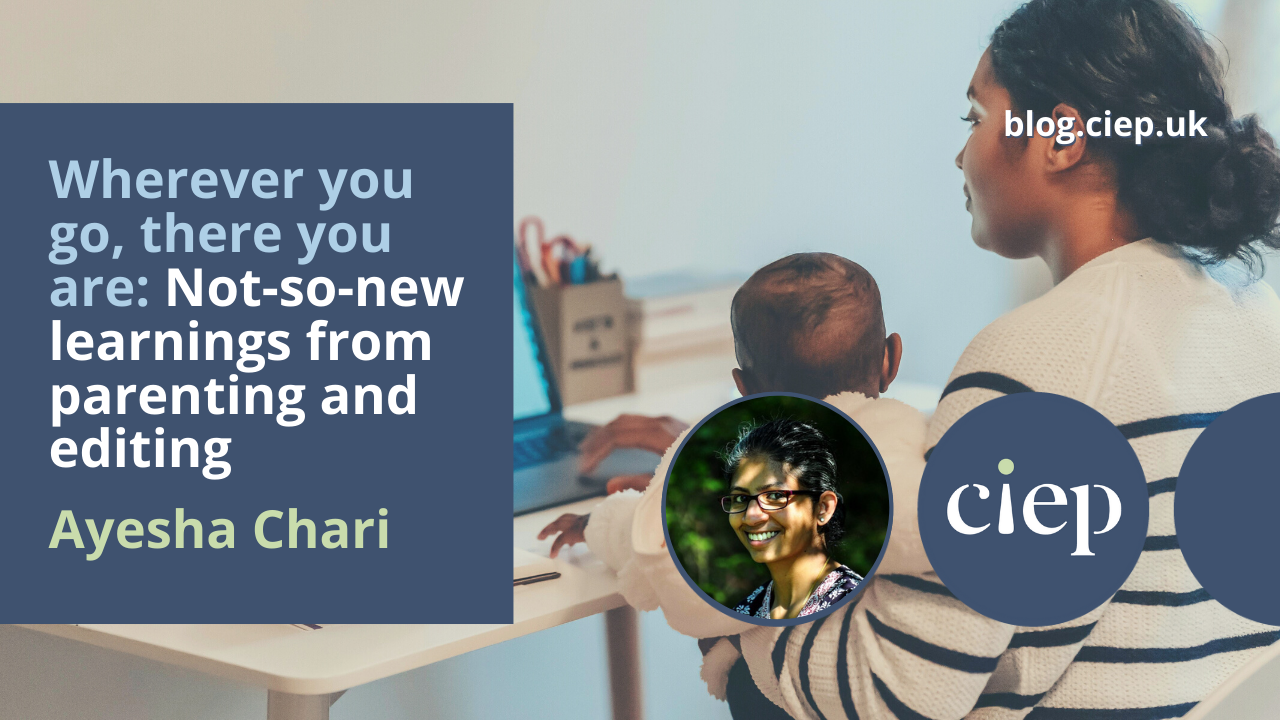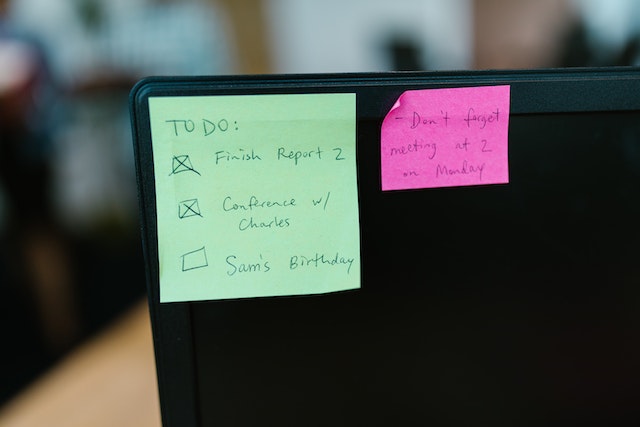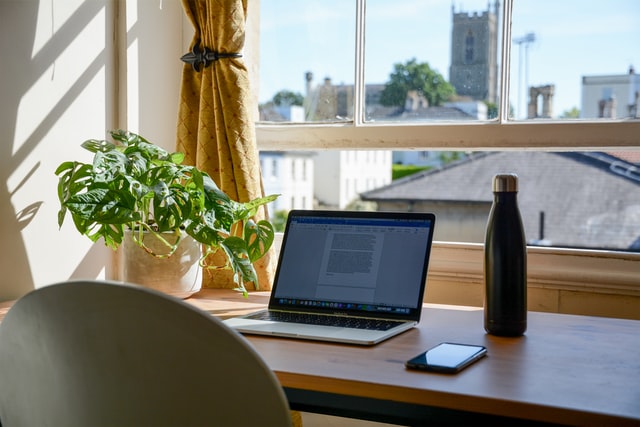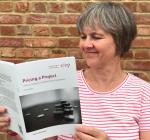In this post, Ayesha Chari shares her experiences on running a freelance editing business while bringing up a young child. She opens up about her struggles to juggle work and childcare, some of the ways she’s had to adapt her work routines, and the things that have helped her to get through it all.
Acknowledgement: with thanks to clients and colleagues who’ve made safe spaces for conversations over the years. This is more personal than I wanted it to be, but I hope sharing will make someone somewhere feel they’re not alone. And that we can learn from each other if we let ourselves find community, even when we least expect it possible.
My four-and-a-half-year-old is coughing away as I attempt for the umpteenth time to write a sentence beyond the blog heading (which, at the moment, reads ‘CIEP blog’, but I hope will be cleverer by the end of this, if that comes). The noise from their tiny hands rumbling a box of classic Lego pieces in search of the perfect one for the pizza-delivery truck they’re building is deafening. The TV is playing today’s game of the ICC Men’s T20 World Cup 2022, silently. The partner has taken care of breakfast, cleared up and is going out for a quick haircut before the rest of our day unravels. Another device in the house, I’m not quite sure where, is playing Bollywood songs I’m annoyingly humming in my head on and off every time I get distracted from writing the next sentence here* or trying to figure out how many more days I should wait before getting the child seen by the professionals for the cold and cough that never seem to go away fully now that they’re in school.
(*It has taken me so long to focus that now the game has changed from whacking a ball with a bat to kicking it around furiously for 90 minutes. I hope you will be reading this before the 2022 FIFA World Cup trophy is won, but don’t be surprised if it’s well into the New Year!)
Yes, school. Who’d have thunk I’d be a four-and-a-half-year-old parent and still wondering how I got to where I am, where we all are as a family?! That I’d also be decently self-employed for now nine years and finally ready to call what I do a business. It feels like it was only yesterday that I took our sleeping cuddle-bundle to their first CIEP (then SfEP) local group meeting in person. Together, we’ve since attended nearly three years of regular virtual meetings, fewer in-person ones because masked life, one in-person annual editor conference, three virtual ones, and several editing and business-related webinars. My child’s also been a massive part of everyday editing – it’s about cooperation, I’m learning – and has even got surprisingly excited through my website-building journey last year. So, what, if anything, is this really about?
The not-so-brief backdrop
The year before parenthood was my first financially productive year in five years of freelancing. (New editors: sometimes it can take a while; hang in there, it’s well worth it.) It was that which helped me decide I wanted to stay self-employed and not fill in another full-time editorial job application. Ever.
I was already an Advanced Professional Member of the now CIEP, had committed to training regularly, was relatively active in the editorial community of colleagues-slowly-becoming-friends, and had regular clients who promised to be in touch as soon as I was ready to end maternity leave.
They kept their word, and I was officially back at work as an eight-month-old parent–editor. Without family or friends nearby to help with occasional dailyness, I struggled. We struggled. My workday started, reluctantly, when my partner took over child and house after his full day at work. I’m a morning person (as is the little person, so far), and though I get by with less than average sleep in general, this shift in routine was painful. I struggled to settle into any sort of rhythm, hated working in chunks of time not in my control, felt miserable not being able to take on as much work as I wanted to. The list is long.
The silver-lined obstacle course
A few months in, when the new parenting–editing work routine was beginning to feel a little less frantic, comfortable even, my partner’s work circumstances changed and we found ourselves doing weekdays apart and weekends together as a family. My workdays became night shifts and weekends, and grocery shopping, laundry, essential and non-essential household sundries had to be reorganised. We were maze runners, again.
But there were silver linings. I’ve had the most understanding of clients, a couple of whom were in similar situations as new parents and carers, and eternally supportive colleagues at the end of a direct message or even a phone call if I dared. It felt reassuring to know we were going to help each other get through each assignment one day at a time. Courses have got done, learning has happened, calamities have been overcome and tides ridden, new clients have had work published successfully, deadlines have been met, conferences and meetings have been attended, old tricks shared and new ones picked up, illnesses have been survived, growing confidence in business acquired, and food and laughter have made it to the table among family, friends and strangers even.
The pandemic, as all of us have experienced, magnified the hurdles, with or without children in the mix, with or without much change to daily routines for those with an already functional bedroom or under-the-staircase office. At a cost both personal and professional. But the editing communities that I’ve made my home show me every day that we’re in this together.
Lessons learnt and unlearnt
Clients and deadlines – the relationship puzzle
Emergencies and planned family time both need accounting for. As editors, we all know we’re cogs in the publishing/communications landscape we work in. We take pride in meeting those deadlines, many of which every now and then are not met by others in the same chain. Quite possibly with valid reason and for causes beyond their reach. Yet, we go into a flap when one creeps up on us. The uncertainties of parenting and other caregiving responsibilities make it trickier to plan around deadlines, holidays, rest and recuperation.
For me parenthood has reinforced the importance of being transparent about what I can/can’t and will/won’t do. The boundaries I set for myself help to create realistic expectations with clients. I share as many or as few details as I want to, but if I need time off I let my clients know as early as possible – whether my child is unwell (which can happen overnight), I’m planning CPD time off or I’m unavailable at fixed times of the year. When agreeing deadlines with author-clients specially, I ask if they have other commitments – caring responsibilities, travel, work – and require buffer in the schedule. I make sure they’re comfortable sharing if the need arises and set ground rules about communicating openly and often, especially when a change that may affect the editing project is anticipated.
If the ongoing pandemic has taught us anything it is that we’re all human, that life happens, that priorities lie on an ever-changing spectrum. Extrovert or introvert, people thrive in relationships, in community. Children are brilliant examples of the natural need for human connection. My work is as much about editing as it is about communicating, clearly and well. I’m a strongly opinionated introvert who’s on a mission to learn to be unafraid of sharing, of having difficult conversations and of collaborating consciously. Build your editing business on relationships, not textbook rules.
Scheduling – flexibly firm routines
Changing, erratic routines come with the territory that is parenthood. It’s one of the first lessons in the role. Not a pleasant one if like me you thrive on being in control. Not fighting the change makes dailyness slightly less painful. Guilt – for working too much, letting your child cling to you, not working enough, letting someone else care for your child, for yelling, not being firm enough, for sleeping or even eating that last cheese slice/cookie – will come and go. That is reality too. See it for what it is and let go.
In late 2021, a 12k-words-long article that should’ve taken a few hours’ work took a very guilt-filled, tearful two weeks to edit. If I took my own medicine, the matter would’ve been easier to close the chapter on a year later. I know now it won’t be the last, only that moving on will happen with a smidgen less anger. I fought with myself to make the most of my peak productive morning hours, but ended up swinging between tears and fury by the end of daylight hours because I hadn’t edited anything, hadn’t ‘worked’. Not even when the child was asleep and I’d planned to send those emails, clean up files, sort author queries. Vicious cycle until I realised that I was still efficient, just in a different way from what I was used to. It made the editing at night so much smoother: slower but simpler. Routines as a family change with time, age and circumstances. Being flexibly firm is a middle path worth trekking. Unnatural-to-you rhythms can be your friend if you prioritise you in the equation.
Juggling tasks – caregiving versus business
I’ve worked around caring for others, older family and ill friends before. But a little human who needs 24/7 attention of some form is a different juggling act altogether. So, how do you handle the responsibilities? I’ve found (re)prioritising is a constant and perfection a myth. Doing a job well involves managing one’s own expectations and self-care too. Think about whether and how you can share tasks with a partner, with other family and friends, or pay for professional care.
Being not OK is not OK. Running a business and childcare (read: life) don’t come with manuals and are not meant to be in constant opposition. It has taken lots of trial and error for me to get comfortable with what works for us as a family and for me as a self-employed parent. If I could mass-produce sticky-notes for new parents, they’d include ‘Ask for help’, ‘Don’t apologise for having a child/being a parent/having needs’ (in check boxes), ‘Ask for help’, ‘It’s OK to be not OK, but also not’, ‘No rights and wrongs’, ‘No guilt’, ‘Go outdoors’, ‘Work or life, seek help’ (yes, again). Parenting and editing aren’t mutually exclusive: which takes priority when depends on your circumstances.
Superpowers – multitasking ninja or specialist wizard?
Parenting, editing and running a business require all the superpowers of the universe and some. No fooling anyone! Have I got said superpowers? ’Course not. Has my ability to run a business changed since parenthood? Of course it has!
I’ve got more confident in recognising that with responsibility comes power (or is it the other way round?!) – the power to choose when and how to multitask, to focus, (re)train, specialise or generalise, who to work with, what to work on and which services to offer. The power to know when to take time off, how to organise schedules, when to let the laundry pile and the dust collect or hire help with housework, when and how to turn down projects, how to delegate. Even how to put on those trainers and run round the block. (What I’ve not been able to do is figure out how on earth you listen to a podcast while ironing or cooking.) Whatever your superpower, don’t be afraid to restructure your business to suit your family’s needs.
Helpful reminders – editing and parenting
- Cliché and all, but find your people. Join that professional network, care and share. Build a strong referrals list of colleagues for when your juggling is wobbling. Your clients and colleagues will be grateful. CIEP, ACES, EFA, Editors Canada, IPEd, MET, Sense, ICF, PEG South Africa are all welcoming communities meeting different needs. Find a good fit for you and your business.
- Plan for eventualities, money and time-wise. Broken bones, illness (sudden or otherwise), school and non-school events, loss and grief, special-O days (birthdays, first-time days). The inventory is endless. Prioritise, compromise, get help, slow down to snail’s pace.
- Practise efficient editing. Leave buffer time for all projects as default, then add some more. Have healthy money chats. Use tools and tech to make life easier but don’t hesitate to unplug whenever you need. Make time for yourself mindfully, even if five minutes (mine is when I brush my teeth).
- Make practical changes. Adjust your work space to make it child-friendly. (You will have to share the colourful pens and good stationery sooner than you realise!) Set reminders around your child’s activities and school routines. Use a simple planner to accommodate work and family. Involve your child in your work like they involve you in their play. (Mine is an expert scanner and knows when to flip document sides in the machine.)
- Find other parents – they need you as much as you need them. Look online but also ask about events in public spaces like libraries, community centres, activity clubs, neighbourhood facilities. Ask your healthcare providers for local networks. Ask parent-friends and parent-colleagues.
For more practical tips, check out coach and fellow-editor Laura Poole’s Juggling on a High Wire: The Art of Work–Life Balance When You’re Self-Employed. It is an excellent, essential read for all who work freelance, with a separate section on ‘Caring for Others and Yourself’ and a chapter on ‘Working at Home When You Have Kids’.
Open forum! Share your favourites and anything that has helped you as a parent and editing business-runner.
About Ayesha Chari
 Ayesha Chari is an Advanced Professional Member of the CIEP and an independent editor specialising in sensitive editing of interdisciplinary academic writing. When not helping scholars solve content and language problems, she can be found helping undo extra tight Lego bits, hiding glitter, dreading the next dress-up day in school as much as muddy puddles, excitedly jumping at every new word her nearly five-year-old reads (now often in Mama’s emails!), and teaching them to identify constellations in the night sky, among other things.
Ayesha Chari is an Advanced Professional Member of the CIEP and an independent editor specialising in sensitive editing of interdisciplinary academic writing. When not helping scholars solve content and language problems, she can be found helping undo extra tight Lego bits, hiding glitter, dreading the next dress-up day in school as much as muddy puddles, excitedly jumping at every new word her nearly five-year-old reads (now often in Mama’s emails!), and teaching them to identify constellations in the night sky, among other things.
 About the CIEP
About the CIEP
The Chartered Institute of Editing and Proofreading (CIEP) is a non-profit body promoting excellence in English language editing. We set and demonstrate editorial standards, and we are a community, training hub and support network for editorial professionals – the people who work to make text accurate, clear and fit for purpose.
Find out more about:
Photo credits: header image by William Fortunato, parent and child at a laptop by August de Richelieu, parent reading to child by Lina Kivaka, sticky notes on a monitor by RODNAE Productions, all on Pexels.
Posted by Eleanor Smith, blog assistant.
The views expressed here do not necessarily reflect those of the CIEP.





















